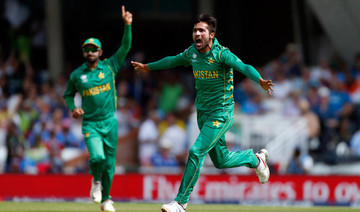DUBAI: While India and Pakistan’s fierce cricket rivalry has been on display at the Asian Cup in the United Arab Emirates, some families in the country have divided loyalties.
The UAE is home to many cricket-loving cross-border couples from India and Pakistan who find it an easier option than living on the subcontinent, where Pakistanis have trouble getting visas for India, and vice versa.
Cross-border ties have been strained ever since the violence and upheaval that accompanied the creation of modern India and Pakistan at the end of British rule in August 1947.
The two have fought three wars since becoming independent, deepening mistrust and suspicion of each other, while thousands of families remain divided by the border.
Relations further soured after the 2008 Mumbai attacks, and cross-border unions are now few and far between.
One rare high-profile example is Indian tennis player Sania Mirza and her husband, Pakistani cricketer Shoaib Malik, who have a home in Dubai.
Indian national Kasim Vakkil and his wife Ghazala, from Pakistan, are also part of the UAE’s large South Asian community.
“My marriage would not have been possible if we were not living in UAE,” Kasim told AFP.
“Ghazala is from Lahore and I am from Mumbai but living at this neutral venue made our marriage possible.”
They came together through cricket when Kasim met his future father-in-law at a game between Pakistan and South Africa in the UAE, where Pakistan hosts games owing to the risk of terror attacks on home soil.
“I went to watch a match between Pakistan and South Africa in 2014 where I met Ghazala’s father which became the first step toward our proposal,” said Kasim, a former college-level fast bowler in Mumbai.
“I would not have imagined watching Pakistani cricketers like Shahid Afridi, Abdul Razzaq and Mohammad Amir before my own eyes but it became possible since UAE became a neutral venue for the Pakistan team.”
Ghazala, who works in human resources, said watching India and Pakistan play made her think of home.
India thrashed Pakistan by eight wickets in the group stage and they are set to meet again in the Super Fours on Sunday.
“Now with India and Pakistan playing in UAE for the Asian title it has given us double joy as we get to see players from both the countries which gives us a nostalgic feeling,” said Ghazala.
India is playing in the Emirates for the first time since 2006, sparking huge interest among the country’s large number of Indian expats.
Club-level cricketer Naveed Siraj hails from Srinagar in Indian-administered Kashmir, while his wife, Nida, is from the Pakistani capital Islamabad.
“My uncle and aunty lived in Kuwait and Nida’s family were their neighbors so they initiated the talk for our marriage,” said Naveed.
“UAE is a neutral venue for all the expats from Pakistan and India so everyone lives here in comfort and enjoys everything including cricket.”
Dubai taxi driver Sunil Manohar, from India’s Karnataka state, married Nunda from Pakistan’s Sindh province after their families met in the UAE.
“UAE is a nice place for cross-border families,” he said. “In the past, a few couples were stuck in Pakistan because they were not getting an Indian visa.”
Over the boundary! The cricket-loving India, Pakistan couples bowled over in UAE
Over the boundary! The cricket-loving India, Pakistan couples bowled over in UAE

Pakistan to promote mineral sector at Saudi forum this month with 13 companies

- Delegation will take part in the Future Minerals Forum in Riyadh from Jan. 13-15
- Petroleum minister will lead Pakistan, participate in a 90-minute country session
ISLAMABAD: Around 13 Pakistani state-owned and private companies will attend the Future Minerals Forum (FMF) in Saudi Arabia from Jan. 13 to 15, an official statement said on Friday, as the country seeks to ramp up global engagement to develop its mineral resources.
The FMF is an international conference and investment platform for the mining sector, hosted by mineral-rich countries to attract global investors, companies and governments.
Petroleum Minister Ali Pervaiz Malik confirmed Pakistan’s participation in a meeting with the Saudi envoy, Nawaf bin Said Al-Malki.
Pakistan hosts one of the world’s largest copper-gold zones. The Reko Diq mine in southwestern Balochistan, with an estimated 5.9 billion tons of ore, is partly owned by Barrick Gold, which calls it one of the world’s largest underdeveloped copper-gold deposits. Its development is expected to boost Pakistan’s struggling economy.
“Upon an invitation of the Government of the Kingdom of Saudi Arabia, the Federal Minister informed the Ambassador that Pakistan will fully participate in the upcoming Future Minerals Forum (FMF), scheduled to be held in Riyadh later this month,” Pakistan’s Press Information Department (PID) said in an official statement.
The Pakistani minister will lead his country’s delegation at the FMF and take part in a 90-minute country showcase session titled “Unleashing Potential: Accelerating Pakistan’s Mineral Revolution” along with local and foreign investors.
Pakistan will also establish a dedicated pavilion to highlight the vast potential of its rich geological landscape to the global mineral community.
The Saudi envoy welcomed Pakistan’s decision to participate in the forum and discussed enhancing bilateral cooperation in the minerals and energy sectors during the meeting.
According to the statement, he highlighted the potential for cooperation between Saudi Arabia and Pakistan in the minerals and energy sectors, expressing confidence that the FMF would provide a platform to expand collaboration.
Pakistan’s mineral sector, despite its rich reserves of salt, copper, gold and coal, contributes only 3.2 percent to the country’s GDP and just 0.1 percent to global mineral exports.
However, many countries, including the United States, have shown interest in Pakistan’s underdeveloped mineral sector, particularly in copper, gold and other critical resources.
In October, Pakistan dispatched its first-ever shipment of rare earth and critical minerals to the United States, according to a Chicago-based US public relations firm’s report.











